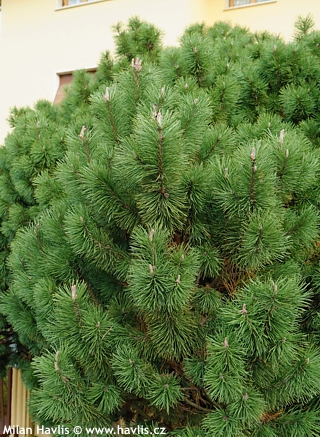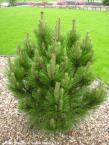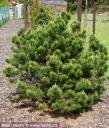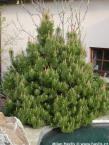Pinus nigra (Pinus austriaca) 'NANA'

Pinus nigra (Pinus austriaca) 'NANA'
dwarf Austrian pine
dwarf Austrian pine
| SIZE/TYPE | medium-sized shrub |
|---|---|
| USUAL HEIGHT | 1.5-3m |
| USUAL WIDTH | 1.5-3m |
| LEAVES | evergreen conifer |
| COLOUR OF LEAVES |
 green green |
| LOCATION | full sun |
| SOIL TYPE | acidic (peaty) to neutral |
| USDA zone (lowest) | 4 (down to -34°C) |
| WINTER PROTECTION | |
| FOR ZONE 5+6 |

|
| FOR ZONE 7 |

|
| BELONGS TO CATEGORIES | Conifers |
Austrian (black) pine was first classified by Austrian botanist Johann Arnold in 1785 (not Arnold Schwarzenegger). It is a hardy tree which escaped Austria (like Arnold Schwarzenegger) in early 20th century, and can now be found all around Europe, down to Turkey, and in North Africa. Hard to say if Mother Nature needed a stronger substitute for more tender species in the ever-changing climate, or whether this one is simply invasive. In any case its more than a century old journey has proved its toughness and durability. no wonder that new varieties are being bred and selected. They generally offer slower growth, smaller size or different habit suitable for common-sized gardens.
Pinus nigra Nana is a witches’ broom whose discoverer is not known. It is a slow and compact growing black pine which at the first sight looks almost identical like a dwarf mountain pine (pinus mugo). The tell is the needle size – its evergreen needles are 6-8 cm long, dark green, partially glossy, slightly undulated, and come out in pairs.
It grows slowly, only some 10-15 cm per year, into a rounded shrub which shows a sign of a leader on your plants which other branches catch up later forming a dome-shaped conifer 2.5-3m tall and wide in maturity. It is a great plant for large rockeries or pots, and ideal for bonsai makers.
Pines need full sun and well-drained soil that will not be too alkaline. No fertilizing required. Pruning is possible in late winter or late summer, never cut into branches which lack needles. You can shape the tree by removing or trimming "candles" - young new shoots before they develop proper-size needles. Austrian pine is commonly hardy to about -40°C (USDA zone 3) and this variety is supposed to withstand at least -34 °C (USDA zone 4). It is also hardy for growing in a container where it will be prone to lose older needles sooner.
Last update 11-04-2021
Pinus nigra Nana is a witches’ broom whose discoverer is not known. It is a slow and compact growing black pine which at the first sight looks almost identical like a dwarf mountain pine (pinus mugo). The tell is the needle size – its evergreen needles are 6-8 cm long, dark green, partially glossy, slightly undulated, and come out in pairs.
It grows slowly, only some 10-15 cm per year, into a rounded shrub which shows a sign of a leader on your plants which other branches catch up later forming a dome-shaped conifer 2.5-3m tall and wide in maturity. It is a great plant for large rockeries or pots, and ideal for bonsai makers.
Pines need full sun and well-drained soil that will not be too alkaline. No fertilizing required. Pruning is possible in late winter or late summer, never cut into branches which lack needles. You can shape the tree by removing or trimming "candles" - young new shoots before they develop proper-size needles. Austrian pine is commonly hardy to about -40°C (USDA zone 3) and this variety is supposed to withstand at least -34 °C (USDA zone 4). It is also hardy for growing in a container where it will be prone to lose older needles sooner.
Last update 11-04-2021
SIZES and PRICES
CURRENTLY SOLD OUT
GLOSSARY
|












